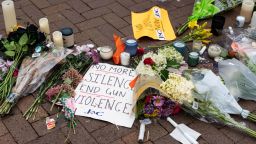Mass shooters generally don’t just snap.
Instead, they plot. And many outwardly display troubling signs along their pathway to violence.
That assessment from the renowned profilers at the FBI’s behavioral analysis units underpins a new effort by the bureau to inform the public of key warning signs ahead of gatherings for the Fourth of July – a holiday period that researchers say tends to feature an increase in mass shootings.
The FBI says that if people report seeing threat indicators that would-be shooters typically exhibit, they may very well prevent a massacre.
What are the warning signs?
“You have someone who may be more fixated on violence, maybe obsessively focusing on violent fantasies or ways to resolve their different challenges,” said Karie Gibson, who leads one of the FBI’s behavioral analysis units and holds a doctorate in psychology. “They may actually record or write a manifesto or an actual video or suicide note, to really want to take credit for this plan they are preparing to do.”
Noticeable shifts in behavior are also key.
“You have somebody who, at one time in their life, was functioning in a way where they were handling the stress, and now we’re seeing marked changes to that,” she said. “We’re seeing that they have changes in their school performance or work performance; we’re seeing that they are not participating in hobbies or areas of activities.”
For certain people, the “pathway to violence, a lot of times, will begin with a grievance,” Gibson said. “It can be a slight, it can be an injustice, it can be a wrong that has happened to them – it can be real or perceived.”
No single factor guarantees someone might commit a shooting, but when several concerning characteristics begin to manifest, it could be time to seek help, either from law enforcement, a principal or a supervisor, she said.
‘Our best hope’
“Friends, family, teachers, classmates, workmates, and others similarly situated are our best hope,” Katherine Schweit, mass shooting expert and former FBI executive, wrote in her book “Stop the Killing.”
These people often are best placed to pick up a phone and report concerns – but to make the correct move they may have to push themselves past any notion that they’re not the ones who need to do it, Schweit warned.
For example, she wrote, teachers may simply try to wait out a concerning student and pass them to the next grade. Parents ill-equipped to handle a struggling child may try to pass them off to another relative.
Schweit wrote that those closest to a possible mass shooter might become desensitized to concerning conduct or may refuse to believe the end result could be an attack, but notes speaking up is critical to saving lives.
“We have to accept a willingness to understand that what we see and hear may be a pattern of behaviors that might lead a person to act out violently,” she wrote.
‘Our worst week for shootings’
Law enforcement statistics and independent researchers have continually pointed to summer months as a time of increased gun violence in the US. An especially violent period each year for both mass shootings and individual incidents: July 1-7.
“That is always our worst week for shootings,” said Mark Bryant, executive director of the Gun Violence Archive, a nonprofit that tracks gun deaths and injuries across America.
Both CNN and the Gun Violence Archive define a mass shooting as an incident in which four or more people are shot, not including the shooter.
July 4 itself accounted for more US mass shootings than any other single calendar day over roughly a decade, a 2023 CNN analysis of the Gun Violence Archive’s mass shooting data since 2014 found. The day with the second most number of shootings was the day after – July 5.
Over the past three years, 77 mass shootings happened collectively during the first week of July, Bryant said.
“There are so many people in large groups during that period of time and it’s usually extremely hot,” Bryant said. “You’ll find a difference in an area that is 95 degrees versus a place that is 65 degrees.”
That impact of heat on the rate of gun violence has been studied by academic researchers, who have noted how higher temperatures can result in increased anger, agitation, and hostility.
Other possible factors responsible for an uptick in violence around Independence Day include the consumption of alcohol at gatherings and the sheer number of guns now available in the US, which has often resulted in people attempting to settle disputes with firearms.
Bryant says the odds are, “when one gun comes out, other guns come out.”
More than ‘mental illness’
Although the FBI’s behavioral analysts have long helped law enforcement agencies across the country prevent and solve crimes, the bureau ramped up its proactive approach to curbing gun deaths in 2018 following deadly mass shootings in Las Vegas and at Marjory Stoneman Douglas High School in Parkland, Florida, Gibson said.
That effort included building and supporting more than 150 federal, state, and local law enforcement threat assessment teams across the US to help stop the next mass shooter.
As the initiative has progressed, the FBI has evolved to not just sharing information with law enforcement, but more proactively educating the public about the agency’s behavioral research findings and warning signs.
While a spate of mass killings in recent years has placed greater emphasis on the impact of mental health in driving certain acts of violence, a key finding of the FBI’s examinations of active shooters across the nation has dispelled notions that all shooters are mentally ill, versus those individuals unable to handle the stresses of life, Gibson said.
“This is lending towards really looking at how someone is coping with stress, how someone is managing their life when they’re struggling,” Gibson said. “Let’s help them, let’s help get interventions, because it’s more about that mental wellness issue that they’re struggling with versus an actual mental illness.”


